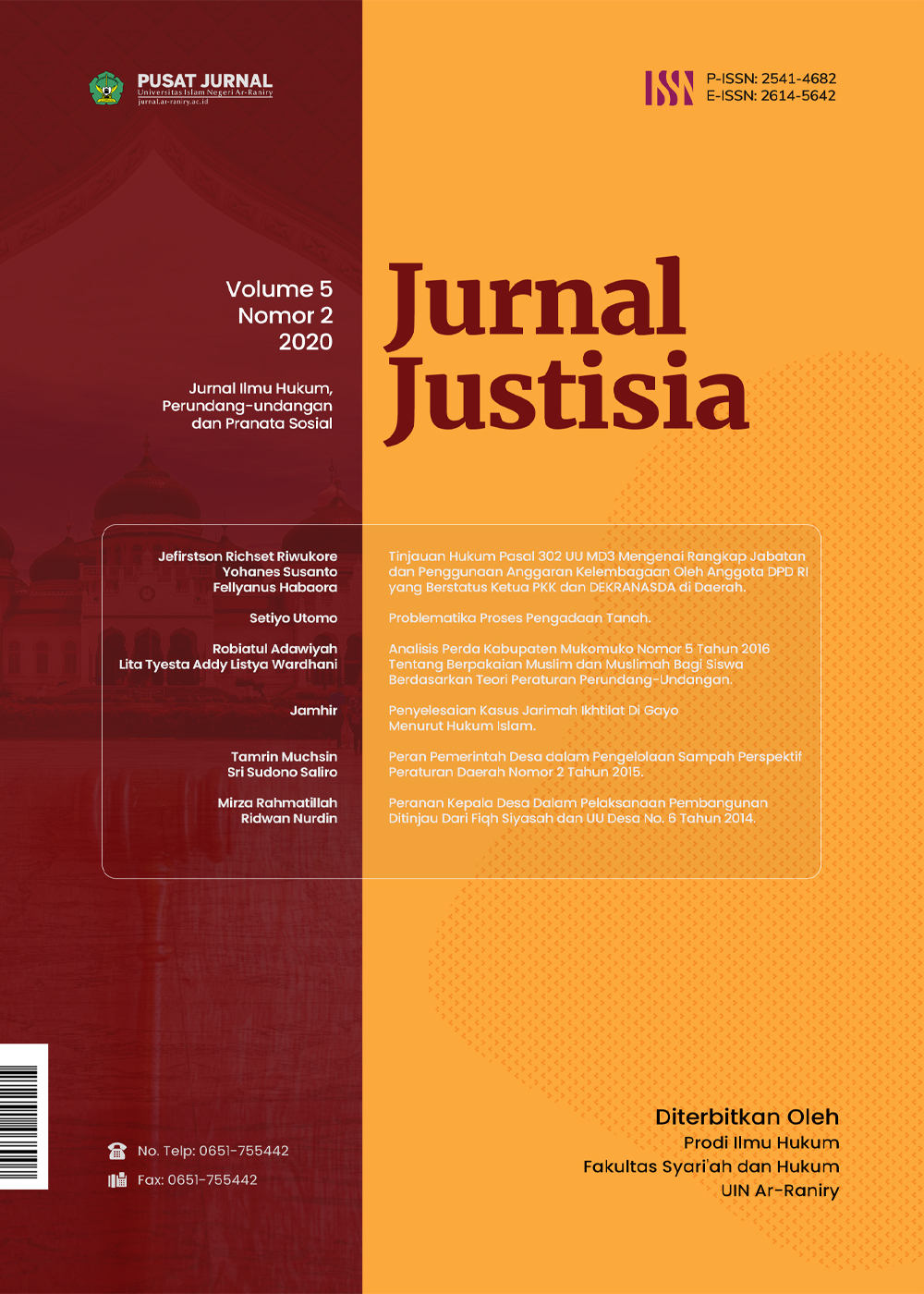Penyelesaian Kasus Jarimah Ikhtilat Di Gayo Menurut Hukum Islam
DOI:
https://doi.org/10.22373/justisia.v5i2.8454Abstract
This research discusses "The settlement of the Jarimah Ikhtilat case in Gayo according to Islamic law". The formulation of the problem put forward is (1). How is the settlement of Jarimah ikhtilath according to Gayo customary law? (2) How is the settlement of Jarimah ikhtilath in Gayo according to Islamic law? This research is descriptive analysis. Using a qualitative approach, namely research describing the results of objective research on situations encountered in the field and analyzed according to Islamic law. The conclusion of this study shows that the customary legal sanctions given to ikhtilath actors in Gayo are a fine of one complete goat or a fine on the agreement of the village sarak opat. If viewed according to Islamic law, that customary law sanctions do not contradict the concept of Islamic law. Because, in Islam it is stipulated that the perpetrator of ikhtilath is part of the finger of ta'zir, where the imposition of the sentence is fully handed over by the government, both in type and size, starting from the lightest punishment such as giving advice to the perpetrator, fines, lashing or exile up to the highest punishment, namely the perpetrator must be killed. The customary law sanctions regarding the ikhtilath case in Gayo include ta'zir sanctions, which type and size are determined by Sarak Opat, namely in the form of a fine of one goat.
References
Abdul Aziz Dahlan, Ensiklopedi Hukum Islam, jilid 4, Jakarta: PT Ichiar Baru van Hoave, 2003
Abdul Qadir Audah, Al-Tasyrī’ al-Jinā’ī al-Islāmī Muqāranan Bil al-Qānūn al-Waḍ’ī, ed.In, Ensiklopedia Hukum Pidana Islam, (terj; Tim Thalisah), jilid I, Bogor: Kharisma ilmu, tt
Abdur Rahman I.Doi, Tindak Pidana Dalam Syariat Islam, Jakarta: PT. Putra Melton,1992
Ahmad Wardi Muslich, Hukum Pidana Islam, Jakarta: Sinar Grafika, 2005
Dinas Syari’at Islam aceh, Hukum Acara Jinayah dan Hukum Acara Jinayat, Banda Aceh, Dinas Syari’at Islam, 2015
Dinas Syariat Islam Aceh, Qanun No 6 Tahun 2014 Tentang Hukum Jinayat, Banda Aceh: Dinas Syariat Islam 2015
H.A. Djazuli, Fiqh Jinayah: Upaya Menanggulangi Kejahatan Dalam Islam, cet. 2, Jakarta: PT Raja Grafindo Persada, 1997
Ibnu Qayyim al-Jauziyah, al-Firasat, ed. In, Firasat, (Ibn Ibrahim), Jakarta: Pustaka Azzam, 2000
--------------, Al-Thurūq al-Hukmiyyah fī al-Siyāsah al-Syar’iyyah, ed. In, Hukum Acara Peradilan Islam, (terj: Adnan Qohar & Anshoruddin), Yogyakarta: Pustaka Pelajar, 2006
Ibrahim Unais, al-Mu’jām al-Waṣīṭ, dalam Mahrus Munajat, Hukum Pidana Islam di Indonesia, Yogyakarta: Teras, 2009
Jamhir, Sarak Opat Sebagai Lembaga Keramat Mupakat dalam Menyelesaikan Kasus Hukum Pada Masyarakat Gayo, Banda Aceh: Disertasi, 2017
Luis Ma’luf, al-Mujid., dalam Makhrus Munajat, Hukum Pidana Islam di Indonesia, Yogyakarta: Teras, 2009
Majelis Adat Aceh, Pedoman Peradilan Adat di Aceh untuk Peradilan Adat yang Adil dan Akuntabel, Banda Aceh: MAA Aceh, 2008
Qanun Aceh No 6 Tahun 2014 Tentang Hukum Jinayat
Qanun Kabupaten Aceh Tengah Nomor: 09 Tahun 2002 Tentang Hukum Adat
Said Hawwa, al-Islām, ed. In, al-Islam, (terj: Abdul Hayyie al-Kattani, dkk), Jakarta: Gema Insani, 2004
Sayyid Sabiq, Fiqh Sunnah, (terj: Nor Hasanuddin), (Jakarta: Pena Pundi Amal, 2006)
Wahbah Zuhaili, al-Fiqhu al-Islāmī wa Adillatuhu, ed. In, Fiqih Islam wa Adillatuhu, (terj: Abdul Hayyie al-Kattani, dkk), jilid 8, Jakarta: Gema Insani, 2011
Downloads
Published
Issue
Section
License
The Authors submitting a manuscript do so on the understanding that if accepted for publication, copyright of the article shall be assigned to Jurnal Justisia : Jurnal Ilmu Hukum, Perundang-undangan dan Pranata Sosial, Ar-Raniry State Islamic University, Indonesia as the publisher of the journal.
Jurnal Justisia : Jurnal Ilmu Hukum, Perundang-undangan dan Pranata Sosial right of first publication with the work simultaneously licensed under Creative Commons Attribution-ShareAlike 4.0 International License (CC BY-SA 4.0) that allows others to share (copy and redistribute the material in any medium or format) and adapt (remix, transform, and build upon the material) the work for any purpose, even commercially with an acknowledgment of the work's authorship and initial publication in Jurnal Justisia : Jurnal Ilmu Hukum, Perundang-undangan dan Pranata Sosial. Authors are able to enter into separate, additional contractual arrangements for the non-exclusive distribution of the journal's published version of the work (e.g., post it to an institutional repository or publish it in a book), with an acknowledgment of its initial publication in Jurnal Justisia : Jurnal Ilmu Hukum, Perundang-undangan dan Pranata Sosial. Authors are permitted and encouraged to post their work online (e.g., in institutional repositories or on their website) prior to and during the submission process, as it can lead to productive exchanges, as well as earlier and greater citation of published work (See The Effect of Open Access).

